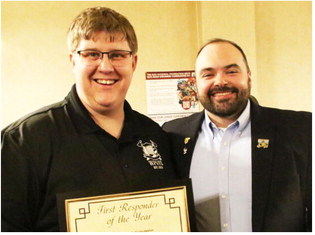some ideas on small changes ….
some ideas on small changes to the bill that could fix it greatly: limiting the water volume in subdivided parcels to 20-acre feet and expanding or doing more than monitoring in yellow areas.
The complexity of SB 358 resulted in a lot of testimonies, both in support and opposition, from the public during the hearing. Cliff Cox, a Broadwater County Farm Bureau Board member, along with Karl Christians, the District 9 Farm Bureau Director, were both present to stand in opposition to the bill. Both shared the impact that could be made on the agriculture industry if the bill passes without amendments.
In correlation with SB 358 is SB 436: Generally revise laws relating to exempt wells sponsored by Sen. Carl Glimm (R) SD 3. This is another way of addressing the exempt well debacle. adds the definition of “combined appropriation” to statute and allocates .5 acre feet (AF) of water to every acres of land in a parcel, as long as the appropriation does not exceed 10 AF and is not a combined appropriation. However, the definition requires a combined appropriation to consist of two or more wells. Technically, under this bill, a landowner could use an exemption (i.e. not go through the permitting process) and extract up to 320 AF of water on a section, as long if they just use one well. This may have been an oversight in drafting, but it is a wild expansion of the exemption, so we opposed. To be fair, the bill was amended on the floor to rein it in, but we remain concerned about how the broad title and how this bill will proceed through the process.
HB 704: Generally, revise ground water laws sponsored by Rep. Mike Vinton (R) HD 40 is similar to SB 358 in that it keeps the red, yellow and green areas but also adds the requirement of hydrological studies to be done by the Bureau of Mines before the DNRC can close a red area, essentially removing red areas and the protections they provide for a very long time. It also takes away consideration of legal availability. HB 704 also limits water users in those red zones to an allotted ½ acre use of water, basically only enough for inside use, for the continuation of subdivision building. MFBF strongly opposed this bill as it does not have adequate protections in place to protect senior water right holders and those who already hold provisional permits. Along with this HB 704 would be more complicated to implement, harder to enforce and still allows the use of water in red areas. It ignores whether or not water is legally available, an important element in determining if there is water available for new uses. Constitutionally, those that were here first in time are first in right. This would jeopardize those senior water users as all water, whether ground or surface, is hydrologically connected.
Meagher County Farm Bureau Board Member, Hertha Lund was again present to share her expertise, commenting that this bill violates the Montana Constitution by taking resources and reallocating property rights. MFBF shared that water usage should be done in a way that is consistent with Montana values; protecting agriculture and the rural communities whose economies depend on it. This bill was soundly defeated on the House floor, just days before transmittal.
MFBF did support HB 775: Repeal sunset on water court actions sponsored by Rep. Ken Walsh (R) HD 69 in House Judiciary. This bill would ensure that the water court remains in place until adjudication is complete. The water court completing adjudication is an important step in consistent future water administration.
Did you know milk is also 87 percent water? MFBF opposed two bills on milk this week in Senate Public Health and Safety Committee, SB 415: Generally revise milk laws and SB 416: Establish label requirements for pasteurized milk both sponsored by Sen. Greg Hertz (R) SD 7. The basis of the two sister bills is to do away with Montana’s 12-day sell-by rule for milk. SB 415 would completely remove the sell-by date on milk cartons while the alternative, SB 416, would set a 17-day sell-by date. MFBF and many other agriculture organizations opposed both bills. The facts brought before the committee by the opponents included that the 33+ dairies in Montana meet and exceed the amount of milk that is needed by Montanan’s, and pride themselves in providing the freshest milk for the state’s consumers. By removing the 12day rule, milk is then less likely to be delivered in a timely manner and consumers, especially those who are rural, running the risk of buying milk that could go bad before they make it home.
Park Farm Bureau Board member Lily Anderson made an important point to the committee, sharing that Montana’s current 12-day rule ensures a stable, fresh, affordable and reliable product. It was also shared that by changing the sell-by date on a jug of milk, you are not changing the fact that milk is still only good for 19-20 days. In the end, long dated milk equals less deliveries which equals less chances of good milk in a consumer’s fridge. MFBF testified on the basis that these types of rule changes should come from the producers of these products who are experts in current best practices and reliant on providing the best milk to consumers.
To throw a curve ball in this week, MFBF supported HB 767: Revise county predator control laws to include goats sponsored by Rep. Julie Darling (R) HD 84. HB 767 is a request from producers to have additional sources for predator control funding. This bill creates a process for goat producers to self-impose a tax to pay for predator control, and is only created if 51 percent of the goats owned in a county are in represented on the county predator petition. This bill would simply allow goats to have the same privileges that cattle and sheep producers have when it comes to county predator control funding.

